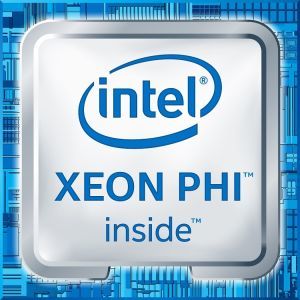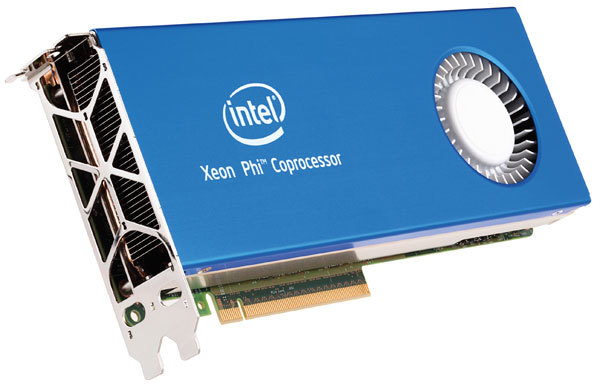A little Intel Xeon Phi can now get everyone
 Intel Xeon Phi is a unique processor like no one else revealing all the advantages of parallel execution of tasks. Created by Intel Many Integrated Core (MIC) technology, it provides you with dozens of powerful cores and a decent piece of integrated high-speed memory. I think that many programmers, both beginners and experienced, would like to “drive” their code on such a processor in order to find its bottlenecks, evaluate the impact of parallelism on performance, and so on. It stops one thing: the cost of the youngest Xeon Phi model is $ 2500, and this is only the processor itself. It is unlikely that many will risk acquiring such a system for personal needs, and such a need, as has already been said, happens.
Intel Xeon Phi is a unique processor like no one else revealing all the advantages of parallel execution of tasks. Created by Intel Many Integrated Core (MIC) technology, it provides you with dozens of powerful cores and a decent piece of integrated high-speed memory. I think that many programmers, both beginners and experienced, would like to “drive” their code on such a processor in order to find its bottlenecks, evaluate the impact of parallelism on performance, and so on. It stops one thing: the cost of the youngest Xeon Phi model is $ 2500, and this is only the processor itself. It is unlikely that many will risk acquiring such a system for personal needs, and such a need, as has already been said, happens.Now the life of enthusiasts is getting a little easier. Education Center Colfax Research, with financial support from Intel, launched a remote access program up to a cluster of servers based on Intel Xeon Phi. The details of the program are under the cut, but first we didn’t write about Intel Xeon Phi for a long time.
Intel Xeon Phi - a brief digression
The Intel Many Integrated Core (Intel MIC) architecture has been involved in the company for a very long time, beginning in the early 2000s, perhaps even longer than it would have liked, since the visible results did not appear immediately. Initially, it was supposed to release a GPGPU product, but then plans changed, and as a result, a computer-to-computer co-processor was created with its operating system, computing resources and system for interacting with the host platform.
The first generation of Xeon Phi coprocessors was released in early 2013. Their specific feature (reflected in the title) was that, being with processors, Xeon Phi x100 series was intended only to speed up the calculations and could not be used to run the entire host operating system. However, with their task - the acceleration of what can be parallelized - they coped perfectly, what was written a lot, including on the habr .
')

Intel Xeon Phi first generation
Intel Xeon Phi x100 series provided the user with about 60 x86 cores with 512-bit vector modules operating at about 1 GHz and providing a double-precision calculation speed of more than 1 TFLOPS. As you can see at least from the above link, it provided a multiple increase in the speed of the programs, so Xeon Phi is deservedly registered in many research and scientific computing systems.
The new generation Xeon Phi, x200 , was announced in the middle of last year, we have already written about their characteristics and nomenclature. New Phi compared with the previous ones have three distinctive features. First, they have up to 4 threads per core (these are the only Intel processors with such characteristics). Secondly, they have their own on-board volume of ultrafast MCDRAM memory. And thirdly, the new generation has got rid of the set-top - now they are full-fledged processors with the ability to load the OS. Thus, nothing - except for the monetary aspects, probably - does not interfere with assembling a computer based on Xeon Phi and getting your own 60-bit cores, since motherboards for these processors are also available .

Intel Xeon Phi second generation in the design of the computing module for the server
Parallel programming week
We now turn directly to the initiative. Educational center Colfax Research, known for its articles and educational materials on programming in general and parallel in particular, with the participation and assistance of Intel, installed on its site a server cluster on the Intel Xeon Phi 7250 platform. Their resource is proposed to be used by everyone.
To participate in the program simply register . After approval of your application as soon as available capacity becomes available, you will be provided with SSH access to the cluster for a period of one week (7 consecutive days). The server has everything necessary for the work of the programmer, taking into account the specifics of Intel Xeon Phi:
- Intel Parallel Studio XE Cluster Edition, which includes:
- Intel C, C ++ and Fortran compilers
- Intel MPI Library
- Intel OpenMP Library
- Intel Threading Building Blocks (TBB)
- Intel Math Kernel Library (MKL)
- Intel Data Analytics Acceleration Library (DAAL)
- and so on
- Intel Python 2.7 and 3.5
- Intel caffe
- Intel TensorFlow
Each user is allocated 50 GB of disk space. Don't forget to take everything important with you. Creative parallel success to you!
Source: https://habr.com/ru/post/320972/
All Articles